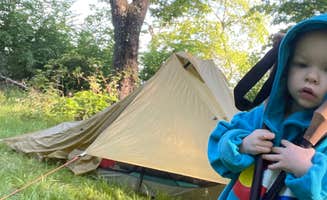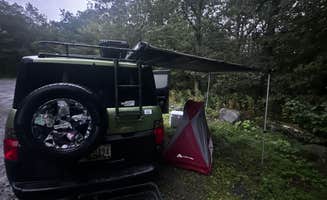Primitive camping near Annandale, New Jersey offers opportunities for self-sufficient overnight stays in the surrounding Appalachian Mountain region. Most dispersed camping sites sit at elevations between 800-1,500 feet, creating cooler overnight temperatures compared to the valley locations. Winter access becomes challenging due to seasonal road closures and reduced maintenance on forest service roads leading to remote campsites.
What to do
Hike to isolated viewpoints: The Bake Oven Knob area includes a challenging rocky hike to an elevated overlook. "The hike to the overlook is really lovely; short and rocky," notes a camper at Bake Oven Knob. This spot functions as both a section of the Appalachian Trail and a day hiking destination.
Explore trail networks: Multiple interconnected trail systems provide day hiking options from primitive campsites. At Thunder Swamp Trailhead, one visitor reports, "Tons of hiking. Went down Saw Creek trail to a marsh." These trails connect to broader networks within Delaware Water Gap National Recreation Area.
Wildlife observation: Dawn and dusk offer opportunities to spot native wildlife including white-tailed deer, wild turkey, and occasionally black bears. Bear activity requires proper food storage, with some designated Appalachian Trail sites providing bear boxes for safer camping.
What campers like
Accessible overnight parking: Several trailheads permit overnight vehicle stays without requiring backcountry hiking. "It's a gravel parking lot. Plenty of shade. No one bothered me," explains a camper about Thunder Swamp Trailhead. These locations serve as convenient base camps for day hiking or as emergency overnight options.
Hammock-friendly sites: Many dispersed camping areas feature mature tree stands ideal for hammock camping. At Appalachian Trail Designated Backpacker Campsite 2, one camper mentions, "Good trees for hammocking. We had thought there was a shelter (there isn't) but it was fine."
Social balance: Some primitive sites balance community with solitude options. "We camped nearer to others but there are secluded spots too," reports a camper at Appalachian Trail Designated Backpacker Campsite 2. This arrangement allows campers to choose their preferred social environment.
What you should know
Water scarcity: Natural water sources are limited or absent at many primitive sites. One camper at Appalachian Trail Designated Backpacker Campsite 2 notes, "I gave the site only four stars because there's no water nearby," adding "Stock up on water at the Dunnfield creek natural area, or wait until Sunfish pond."
Fire restrictions: Most dispersed camping locations prohibit open flames year-round. Pack camping stoves for cooking as alternative heat sources.
Parking limitations: Vehicle-accessible sites have limited spaces that fill quickly on weekends and during peak season. Arrive by early afternoon Thursday through Saturday to secure spots at popular trailheads.
Site identification challenges: Many primitive sites lack clear markings. "The site itself is unmarked when you come to it, but it's the only pretty obvious camping spot on the trail so it's not hard to find," explains a visitor to Appalachian Trail Campsite.
Tips for camping with families
Choose established sites: Designated backpacker sites offer more predictable terrain for setting up family camps. The Appalachian Trail Designated Backpacker Campsite 2 is "well maintained w bear boxes provided," which adds security for camping with children.
Terrain considerations: Campsites often feature uneven ground. One camper notes about Appalachian Trail Designated Backpacker Campsite 2: "it's a little on the small and sloped side for tent camping," suggesting families should arrive early to select flatter tent locations.
Educational opportunities: Several sites connect to historical trail sections with interpretive information about the Appalachian Trail system. These provide learning contexts for school-age children about conservation and trail history.
Tips from RVers
Overnight van camping: Some trailhead parking areas accommodate small vans or truck campers. At Bake Oven Knob, an experienced van camper reports, "I've overnighted in my van here a bunch, no problems." The site offers "two large lots" where smaller recreational vehicles can park legally.
No hookups or facilities: All dispersed camping areas lack water, electric, and waste disposal services. Self-contained vehicles must arrive with full water tanks and empty waste tanks, prepared for complete boondocking.



